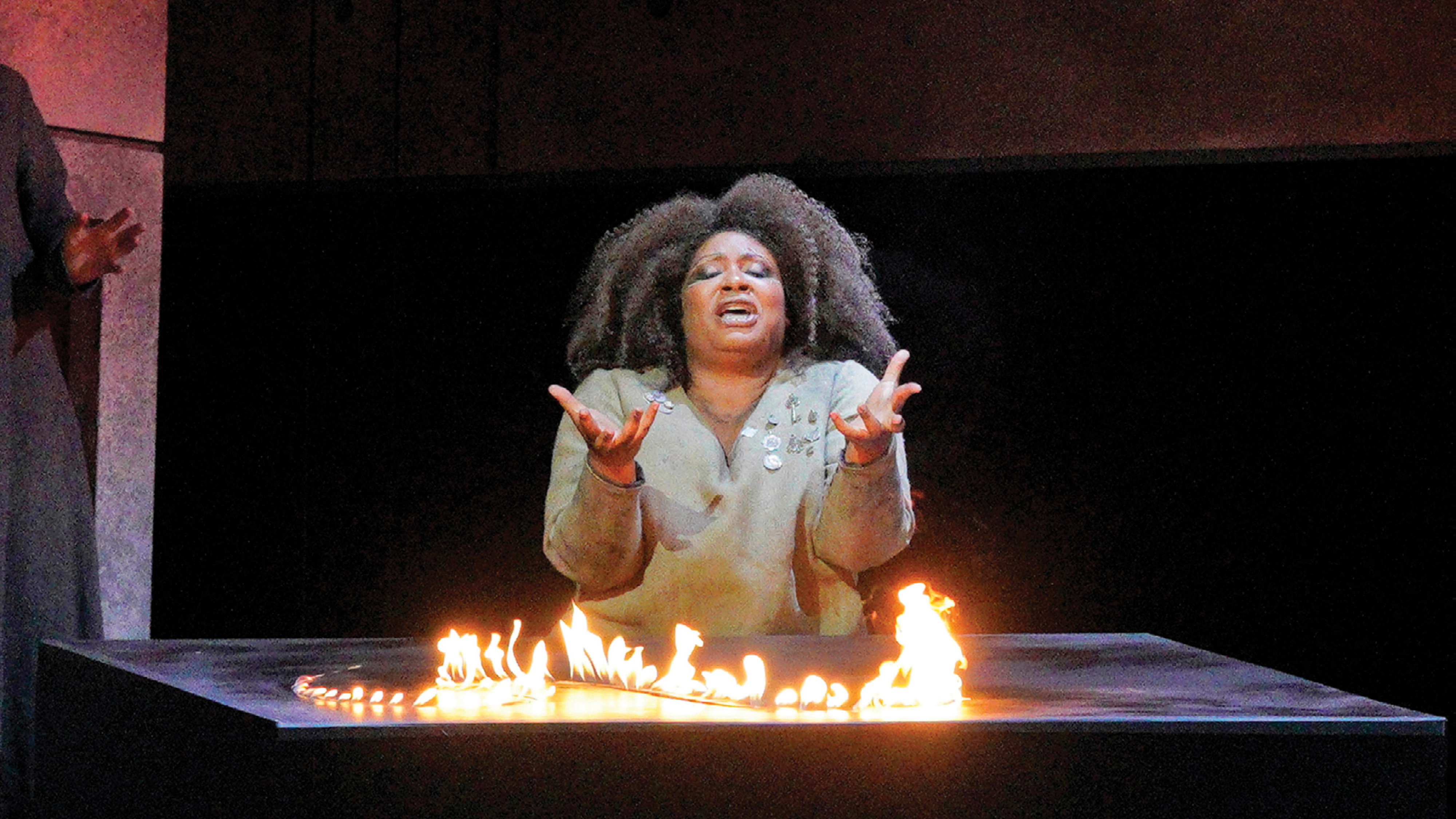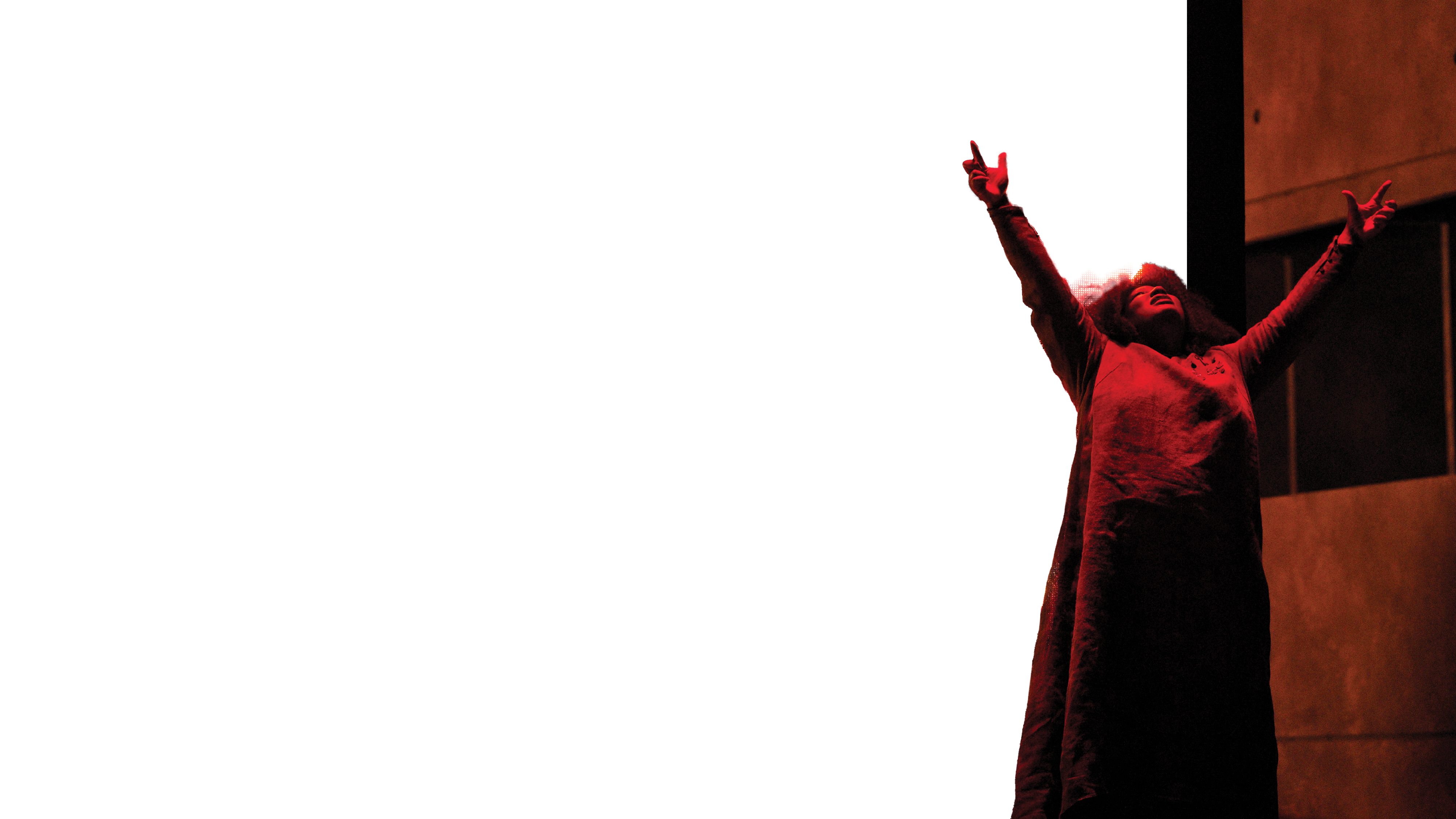Out of Character: Raehann Bryce-Davis
Mezzo-soprano Raehann Bryce-Davis has forged an unordinary path in opera—what she calls “going at it your own way.” The daughter of Jamaican immigrants, she was born in Mexico and raised in Keene, Texas. Her training was typical: studies at UT Arlington and the Manhattan School of Music were followed by a young artist program at Florida Grand Opera. Afterward, Bryce-Davis traveled through Europe with a 2015 touring production of Porgy and Bess. Rather than splurge on “touristy stuff,” she saved her money and used the opportunity to enter competitions across the continent. The sacrifice paid off, and the mezzo established herself on the other side of the Atlantic—a relatively unusual move for an American artist.
It wasn’t until 2020 that she made her Stateside professional debut at Los Angeles Opera. With three days left until rehearsals, she was asked to step in for a vocalist who had pulled out of Donizetti’s Roberto Devereux. When the pandemic suddenly brought that production to a halt, Bryce-Davis recorded her aria as a self-produced music video titled “To the Afflicted.” This was the first in a series of music videos she recorded over the next few years. It’s a medium that’s more MTV than opera, but it’s helped to spread her name and reach untapped audiences.
Bryce-Davis’s career is now evenly split between Europe and the United States. It’s a nomadic existence, but not a lonely one. Her husband Allan Virgo, a fashion designer, joins her on this “roadie life,” along with their dog Cora Petrushka. The cities change as often as her eclectic repertoire, which spans Mahler symphonies, Czech and Russian opera, and contemporary works. But one composer remains a reliable constant: Verdi. When we talk, Bryce-Davis is in Austria singing Amneris in Aida. She’s also earned acclaim as Princess Eboli in Don Carlos. But the complex Azucena in Il trovatore feels tailor-made to her vocal and dramatic strengths.
Opera Cues: Your HGO debut in Il trovatore marks the fifth time you’ve played Azucena. How have you settled into this role?
Raehann Bryce-Davis: Verdi is just such a gift. Specific roles by Verdi—I just put them on, and they’re immediately comfortable. He writes things that make my voice happy. Once you believe in the storytelling and are living that character, then it’s a beautiful experience. And I always feel that way with Azucena.
At the end of the day, I think she’s a woman who loves her child desperately—certainly the baby that she lost. She loves her mother desperately. And I think what changes from production to production is how much she loves Manrico. Has the love transferred to the new child, or is it really a long-game manipulation?
OC: Oh, that’s dark!
RBD: Real dark. But it’s also beautiful because she’s someone trying to stand up for her family, which was so brutally harmed. And this is her justice—making the Count pay

OC: Beyond Verdi, you’ve taken on quite a bit of modern repertoire.
RBD: When I was in school, I was in the contemporary opera ensemble. So I made friends with several composers who were always like, “Hey, I wrote this piece. I have a recital in a week.” But I realized that something I could do was learn very complex music rather quickly—if I have the time. That’s a skill that’s enabled me to take advantage of a lot of opportunities that I wouldn’t have been able to otherwise. Like that Devereux at LA Opera, or when I made my Metropolitan Opera debut in 2022 as Baba the Turk in The Rake’s Progress. That was another situation where the mezzo couldn’t make it, and five days before rehearsal started, they were like, “Can you learn Stravinsky?”
OC: A year later, you returned to the Met for Anthony Davis’s X: The Life and Times of Malcom X. Is it important for you to explore music by Black composers?
RBD: The first music that I heard was my mother singing Jamaican folk songs. So it’s just something that’s always been a part of me and that always will continue to be. You have to make sure that folks from your own heritage and your own culture are also being featured. If art is how we analyze humanity and experience humanity and grow in humanity, then we have to see the full world in art. Otherwise, it’s not real—it’s not the world we live in.
OC: You’ve also worked to achieve change through the organization you co-founded, the Black Opera Alliance. Could you tell me a little about your mission?
RBD: In 2020, after the murder of George Floyd, there was a wonderful opportunity to collectively have conversations. We created a list of steps that would really resonate in the industry and make it a truly more inclusive place—things like hiring Black artists and administrators or making sure that Black artists are prepared for the stage in terms of makeup and hair. Just getting systemic things in the books that would continue.

OC: Tell me about your upcoming album. You recently released a music video of the single “I Praise the Dance” by composer Rene Orth, which is a kind of an opera/dance-pop hybrid.
RBD: I’m so excited about what opera can be. It’s never stayed stagnant. If we listen to Monteverdi and then we listen to Puccini, it sounds like a different being, you know? This is the nature of art: it’s flexible, and it changes. So the album is called Evolution. Every track is a different journey—the operatic voice translating and transforming into Latin beats, into dance hall, into a jazz piece.
My partner was doing a fashion show, and his theme was about the Black cowboys of the Old West. He wanted a soundtrack for when he was showing at Fashion Week in New York, so we commissioned a track by Maria Thompson Corley called “Black Riders’ Freedom Song.” And that thing is such fire!
OC: A country song? You’re going to be the operatic Beyoncé. Then again, Beyoncé did incorporate an Italian art song, “Caro mio ben,” into the track “Daughter” from Cowboy Carter.
RBD: I was so sad that my album wasn’t ready when all that hype went out. But I was like, “Oh, well. We’ll make our own hype.” It’s such an exciting time because the popular world is experimenting with classical music. We have so many drag performers that love opera and are featuring opera. Classical music is always reacting to things. And I want us to be at the forefront of experimentation and doing what’s hot.
OC: You definitely don’t play it by the books.
RBD: It’s been an adventurous road, not necessarily the most traditional. I didn’t do the whole, “follow all of the rules and then somebody will find you.” I think if I had tried to do the waiting for someone to find me, I would be in another career now.